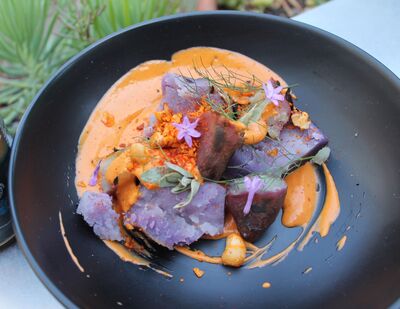Aussie bushfood industry receives a boost

The Australian bushfood industry is set for a boost after a deal was struck between Indigenous Traditional Owners and Custodians and the University of Queensland (UQ).
Launched at UQ’s Gatton campus, the Australian Research Council-funded (ARC) five-year project will see researchers work with Indigenous communities to commercialise native bushfoods and ornamental plants.
The $1.5 million venture features ethnobotanist and Mbabaram Elder Gerry Turpin and a team of academics, community members and business owners led by UQ Adjunct Professor Dale Chapman, an Indigenous chef and CEO of My Dilly Bag.
Adjunct Professor Chapman said there are plenty of great bushfoods out there that most people have never heard of, seen or tasted.
“So we’re thrilled to be working hand in hand with Indigenous communities to get them into the marketplace, marrying Traditional Knowledge with Western science. Together we’ll be developing exciting — and delicious — native Australian bushfoods, while creating sustainable, intergenerational Indigenous businesses,” Chapman said.
“Crucially, this funding allows us to build the infrastructure and develop the science needed to grow high-yielding plants and effectively store a harvest.”

Collaborating food scientist Professor Melissa Fitzgerald said there were several candidates for potential supermarket-friendly bushfoods.
“A great example is the native peanut tree Sterculia quadrifida, which grows in far north Queensland,” Professor Fitzgerald said.
“It produces a beautiful fruit that tastes a lot like peanuts and contains very good oils, but the tree is so tall that it’s hard to harvest. This project will allow us to experiment with growing the tree on trellises and other frameworks, bringing the fruit within reach.”
Fitzgerald also said the shoppers will be able to trace the bushfood from the original growers to the jar sold in a city.
“When a product like this arrives in your local shop, you’ll be able to check its provenance and cultural integrity, thanks to our project’s focus on blockchain technology.”
The project will work with the Mbabaram Aboriginal Corporation, Batavia Traditional Owners and Stepping Black Indigenous Corporation, organisations that include Traditional Owners and Custodians from Batavia Downs, Mbabaram. Eidsvold and Cherbourg.
Genetically modified purple tomato approved in Australia
The genetically modified Purple Bliss tomatoes have now received regulatory approvals in...
Santa creates a spike in Australia's milk demand
Australian households are gearing up for the country's biggest night of dairy consumption,...
Not all processed fats are bad, study finds
A UK study into two types of industrially processed hard fats, which are widely used in the food...










